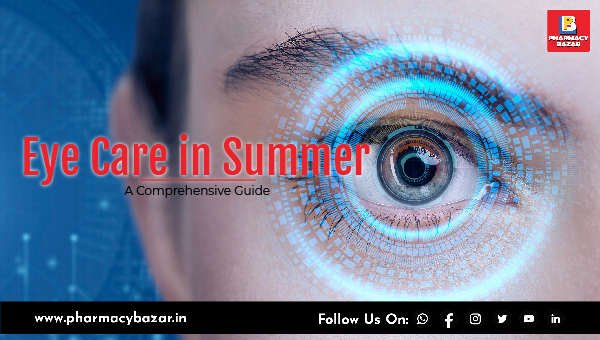Eye Care in Summer: A Comprehensive Guide for Protecting and Maintaining Eye Health
May 06, 2023
The summer months present unique challenges for maintaining optimal eye health due to increased exposure to sunlight, heat, and outdoor activities. This article aims to provide a comprehensive overview of eye care during summer, discussing the potential risks, preventive measures, and tips for maintaining eye health in warmer weather. By understanding and implementing these strategies, individuals can protect their eyes and promote overall well-being.
It is essential to emphasize the importance of eye care during the summer months when various factors can contribute to eye discomfort and potential damage. This article discusses the specific risks associated with summer, preventive measures, and recommendations for maintaining eye health in warmer weather.
Potential Risks to Eye Health in Summer
Summer presents several challenges to eye health, including:
- Ultraviolet (UV) radiation: Prolonged exposure to the sun's UV rays can increase the risk of cataracts, macular degeneration, and growth on the eye surface, such as pterygium.
- Dry eyes: Hot, dry, and windy conditions can contribute to dry eye syndrome, causing discomfort, itching, and blurry vision.
- Allergies: Increased pollen levels during summer can lead to allergic conjunctivitis, resulting in red, itchy, and watery eyes.
- Eye injuries: Outdoor activities and water sports can increase the risk of eye injuries due to accidents or exposure to harmful chemicals, such as chlorine in swimming pools.
Preventive Measures for Eye Care in Summer
To protect and maintain eye health during summer, consider implementing the following preventive measures:
- Wear sunglasses: Choose sunglasses that block 100% of UVA and UVB rays, with a wraparound design to shield the eyes from all angles.
- Use protective eyewear: Wear goggles or a face shield during water sports or when engaging in activities with a risk of eye injury.
- Stay hydrated: Drink plenty of water to maintain adequate tear production and prevent dry eyes.
- Take breaks from digital screens: Follow the 20-20-20 rule (every 20 minutes, look at something 20 feet away for 20 seconds) to minimize digital eye strain.
Tips for Maintaining Eye Health in Summer
In addition to preventive measures, the following tips can help maintain eye health during summer:
- Keep your eyes clean: Gently clean the eyelids and lashes with a damp, warm cloth or a specially formulated eyelid cleanser to remove debris and prevent irritation.
- Manage allergies: Consult with a healthcare professional to identify and manage allergies that may cause eye discomfort.
- Wear a hat: A wide-brimmed hat can provide additional protection against UV radiation and glare.
- Avoid direct sunlight: Limit exposure to direct sunlight, especially between 10 a.m. and 4 p.m., when UV radiation is the strongest.
Seeking Professional Eye Care:
It is important to consult an eye care professional if you experience persistent eye discomfort, changes in vision, or signs of infection. Regular eye exams can help detect and address any underlying issues, ensuring optimal eye health during summer and throughout the year.
Eye care is particularly important during summer months when increased exposure to sunlight, heat, and outdoor activities can present challenges to maintaining optimal eye health. By understanding the potential risks and implementing preventive measures, individuals can protect their eyes and promote overall well-being. Regular eye exams and consultation with eye care professionals are essential to ensure early detection and management of any eye health concerns.
DISCLAIMER: This article is the property of Pharmacy Bazar and is protected by copyright laws. The information provided in this article is for educational and informational purposes only and is not intended to be a substitute for professional medical advice, diagnosis, or treatment. Always seek the advice of a qualified healthcare provider with any questions you may have regarding a medical condition. Never disregard professional medical advice or delay in seeking it because of something you have read in this article. The author and publisher of this article do not endorse any specific treatments, procedures, or products mentioned in this article.
Recent Post

Blood Cancer: Early Warning Signs and Diagnosis

Understanding Gallstones: Causes, Symptoms, and Treatment Options

Navigating Diabetes Medications: Benefits and Side Effects

Revolutionizing Cancer Treatment: How Unleashing T Cells' Energy Could Transform Immunotherapy

The Power of Lower Back Stretches: Benefits and Best Yoga Asanas for a Healthy Spine

8 Health Conditions That Could Be Due to Magnesium Deficiency

Unlocking Brain Health: How Lifestyle Choices Impact Cognitive Functions

When Speech Takes a Surprising Turn: Unraveling Foreign Accent Syndrome

The Optimal Time to Take Your Vitamin D Supplement: Insights and Best Practices

Beyond Diabetes: Unveiling the Hidden Health Risks of Insulin Resistance

